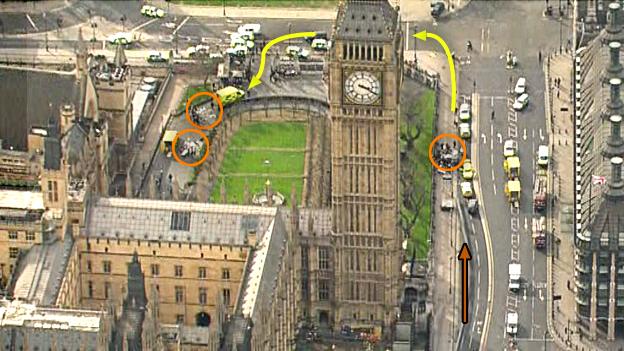London attack: Who was Khalid Masood?
- Published
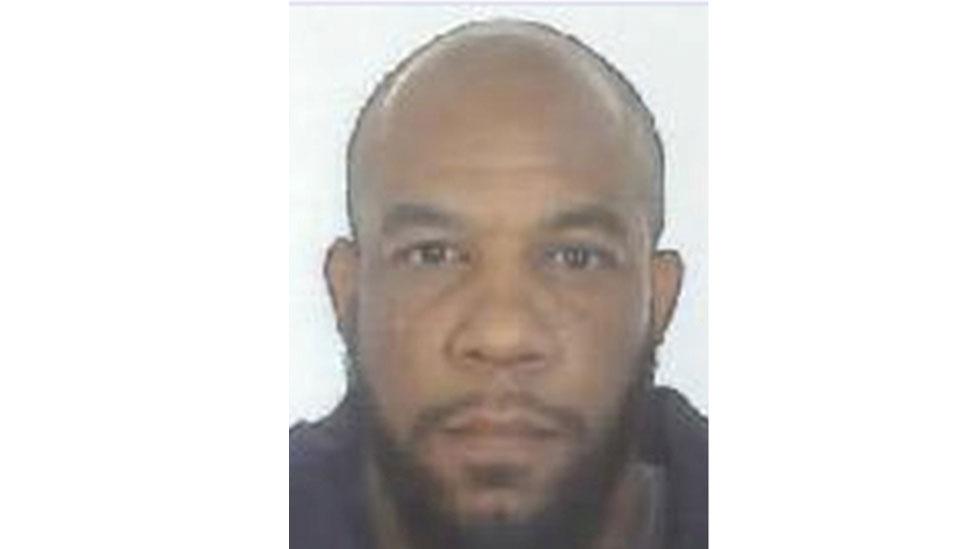
The man responsible for the Westminster attack was 52-year-old Khalid Masood.
He was born as Adrian Russell Elms at Hainault Maternity Hospital, Erith, south-east London, on Christmas Day in 1964.
His father played no part in the newborn's life - and when his mother Janet married two years later, the boy was given his step-father's surname, Ajao.
The future killer would use the surnames interchangeably as an adult, before he converted to Islam and became Masood.
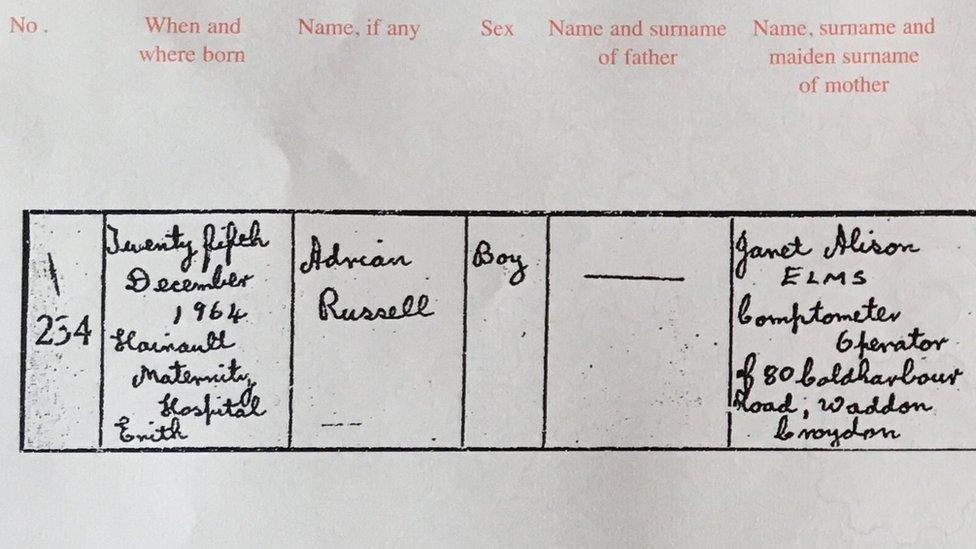
A copy of Khalid Masood's birth certificate shows he was named Adrian Elms
His mother and her husband lived for a while in south London and Adrian was at school in Lewisham until he was 13. His parents went on to have two more sons.
He then he moved to Tunbridge Wells, Kent, with his two half-brothers.
Adrian attended Huntleys School for Boys, having failed to secure a place at grammar school.
In 2013, Masood sent an angry bitter email to his mother about his childhood - and his disappointment with his schooling.
"I remember that email," Mrs Ajao told the inquests. "I have spent a long time thinking what did I do wrong… What should I have done."
His parents later moved to rural Carmarthenshire - and after many years of being estranged from them, Masood visited one last time in the days before his attack. He left that last meeting, telling his mother, "They will say I am a terrorist - but I am not."
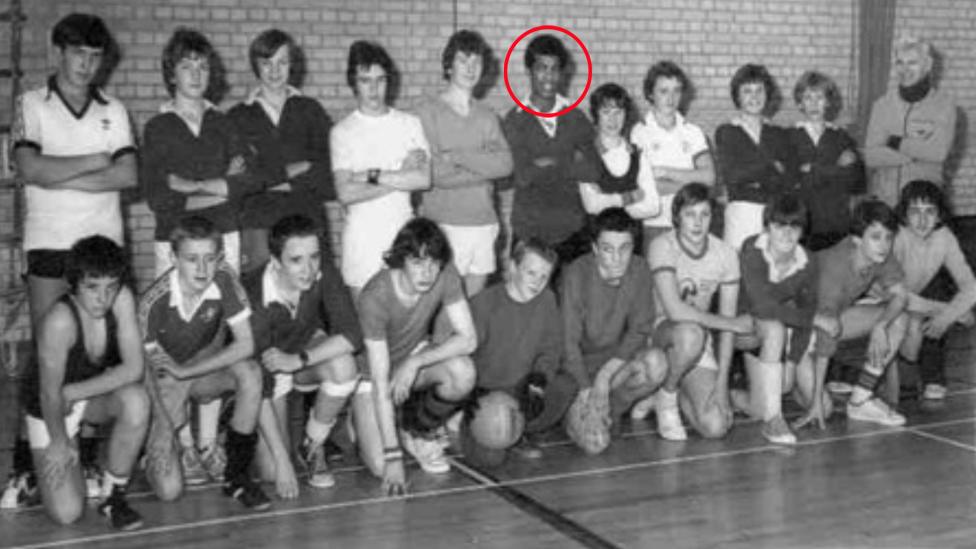
The attacker was born Adrian Russell Ajao, pictured here with his school football team
First offending
Masood's first offending came when he was arrested aged 14 for shoplifting and given a police caution. His mother had sent him out to buy stationery for school - and told the inquests she could not understand why he had not used the money she had provided.
He left school at 16 and and studied for a BTEC in business studies at a local college. And as he entered his later teenage years, his temper developed.
His two brothers told police Masood was "a violent but clever person who wouldn't back down from a disagreement". His mother later told police that she had come to believe years earlier that he could end up killing someone.
And that refusal to back down would lead him into a life of violence.
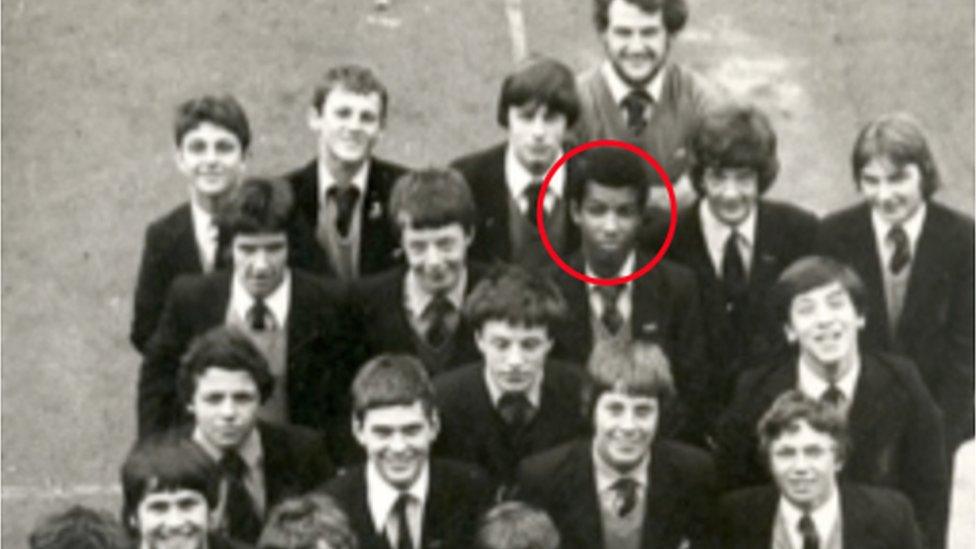
Khalid Masood, then called Adrian Ajao, in his school days at Huntleys Secondary School for Boys
Detective Chief Inspector Dan Brown was in charge of the Metropolitan Police's operation to establish Masood's background
"He would go out locally to pubs and clubs and his mother believes that Masood would go looking for a fight after drinking," he told the inquests.
Despite this violence, his working life appeared to begin well. He was taken on to as a trainee manager for the now-defunct department store Woolworths, and moved to Hastings.
But in October 1983, aged 18, he was convicted of criminal damage and fined £15.
He later walked out of Woolworths and in 1988, when he was 23-years-old, he was arrested in possession of an offensive weapons and for threatening behaviour.
Later he got into a row on a bus, leading to arrest for assault causing bodily harm. Then in 1990 he ripped a telephone from a wall in a restaurant and began to fight officers trying to arrest him.
Adrian Ajao began his first serious relationship the same year after meeting Jane Harvey in Tunbridge Wells. They would go on to have two children and lived in the village of Northiam, East Sussex.
She later told police he was powerful, charming and intelligent - but she would be scared when he was drunk - and they separated once after he hurt her in an incident.
Four years into the relationship, he enrolled at The University of Sussex and graduated with a degree in economics - but his hopes of a career in finance was blocked by his criminal record.
So he began working for his partner's firm, staying there until a more serious act of violence led to prison.
In 2000, he became embroiled in a serious pub attack following a row, which he later claimed was triggered by racism.
He lost his temper with Piers Mott, slashing him on his face and leaving an 8cm gash on his left cheek.
Mr Mott has since died, but his widow Heather recalled the incident.
"My husband was defending someone who was working for him," she said. "I don't know how it happened - Piers was just defending this guy."
Elms/Ajao was jailed for two years and spent time in HMP Lewis, Wayland and Ford. He never returned to live in the village.
This was the turning point in his life. Elms knew he was violent and dangerous - he pleaded guilty to the attack - and his partner left him. In prison, he began reading the Koran, apparently encouraged by a visiting imam who may have been called Khalid. Adrian Ajao began the transition to Khalid Masood.
After his release from jail in the summer of 2001, he moved to Eastbourne - where a man who knew him as a casual acquaintance told the BBC Elms used both cocaine and bodybuilding steroids.
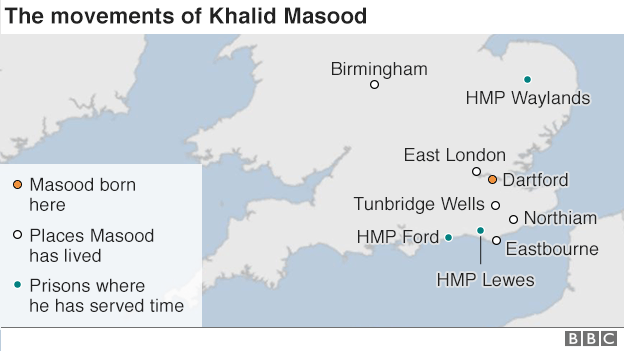
And he was still violent.
He was fined after assaulting a girlfriend - and in 2001 took part in a major pub fight.
"I first met him in a pub around Christmas Eve 2001," the former electrician told the BBC. "He was introduced as 'Black Ady'.
"Everyone who met him said he was really polite, but he was in a pub one night and two guys were playing pool.
"Something was said and he battered them both with pool cues."
The assaults didn't lead to prosecutions - and detectives believed that the suspect had intimidated the victims.
"One time I noticed a Koran and I made a joke like: 'Are you reading that?' He did not seem the religious type at all," said the friend.
"I spoke to my friend who lived with him for a while and he said he used to read the Koran all the time.
"The next time I saw him it was summer 2002 - he was on steroids, though he wasn't huge.
"He took quite a lot of cocaine and he seemed to like women with pink hair. He had one girlfriend and she had silicone breasts."
When Elms and the acquaintance mistakenly thought they were dating the same woman - Elms suggested that if they weren't friends, he would stab him in the face.
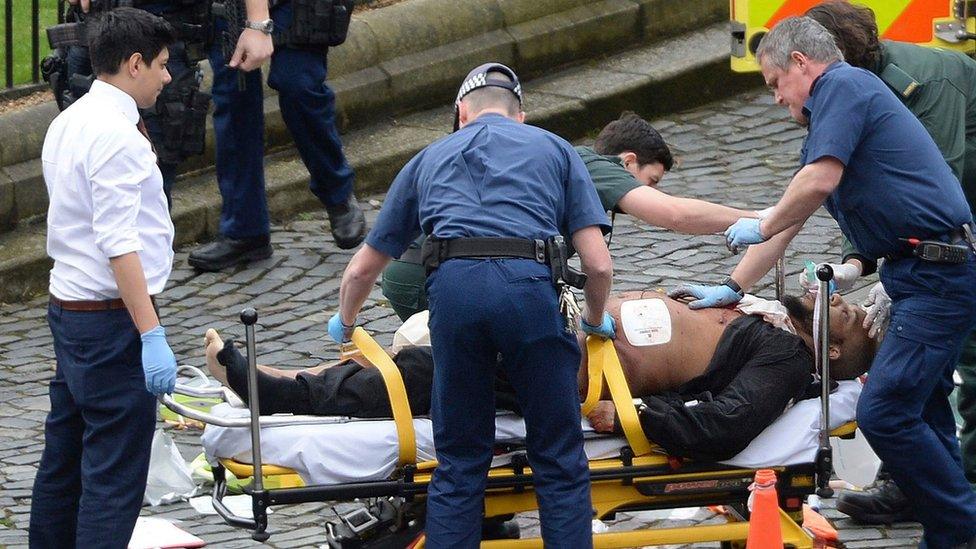
Khalid Masood was shot at the scene of the Westminster attack
Attempted murder
Sussex Police received reports of at least two other acts of violence in 2002 and 2003.
Detective Constable Stuart Black from Sussex Police came across Khalid Masood in the critical period.
"He was trying to increase his reputation and status," DC Brown told the Westminster Bridge inquests.
"Eastbourne is only a small town, and he was just trying to big it up in a small town."
In 2003 the future killer attacked a man called Daniel Smith.
"The injuries were probably the worst knife injuries I've actually seen," said the detective.
After some kind of row over whether or not he was an undercover police officer, Masood began the attack to prove he wasn't.
He lunged at Mr Smith and plunged a knife through his nose. It went through the palate of his mouth, his tongue and into his jawbone.
Masood was arrested and charged with attempted murder. DC Black recalled that during the interview, the suspect was "extremely confident to the point of cocky".

Masood was born Adrian Russell Elms in Dartford, Kent on Christmas Day 1964
His mother married a man with the surname Ajao in 1966. Masood called himself Adrian Russell Ajao, one of a number of identities he had over the years. His family moved around during his youth, settling in Tunbridge Wells, Kent
Masood went to Huntleys Secondary School for Boys in the town, which closed in 1992. A classmate said he was a popular pupil who "liked to party", was a good sportsman and an "all-round nice guy" with lots of friends
His criminal career dated back to 1983, shortly after he left school. Scotland Yard said he had convictions for assault, grievous bodily harm and possession of an offensive weapon, which led to time behind bars at Lewes Prison in East Sussex, Wayland Prison in Norfolk and Ford open prison in West Sussex
Masood then spent two years teaching English in Jeddah in Saudi Arabia, between 2005-6 and 2008-9
Returning to the UK, he most recently lived in Birmingham, but has also spent time in Luton, Sussex and London

At trial, he claimed self defence and was acquitted. The judge, according to accounts, was amazed.
Despite a six-month sentence for the additional offence of carrying the weapon, the attacker had to be released straight away because he had spent that period on remand.
Approaching 40 years old, he had escaped a major prison sentence. And that sealed his belief in God.
He later told others that he had experienced two miracles in his life. One was his daughter's recovery after a serious car accident. The other was his acquittal for attempted murder.
Filled with religious zeal, he would call his mother to lecture her.
"He had met someone in prison who had advised or explained to him [the faith]," Mrs Ajao told the inquests.
"He would telephone - he would never stop talking about it - go on and on and on. I would put the phone down, walk across the room and make a cup of tea and he would still be going on."
What happened next is a little unclear. Police believe that the new convert briefly went to Saudi Arabia. By 2004 he was living in Crawley and using his new name all the time. He legally changed it in May of the following year.
In September 2004 he married Farzana Malik, a Pakistani-heritage Muslim woman in Crawley, West Sussex. The relationship was an utter disaster because Masood was becoming more extreme in his views.
"When I visited in the New Year there was an atmosphere," said Mrs Ajao. "I could feel that Farzana was separate from Adrian. It did not feel right to me. He said later he had five rules that he would like her to follow. What I felt at the time that he was too strict with these rules."
Those rules included trying to control what she watched on TV and whether she met non-Muslims.
What we have now learned is that during this critical period of being a new Muslim, Masood expose himself to the extreme worldview propagated by followers of a now-banned terrorism network.
Crawley was then a centre of activity for Al Muhajiroun, the network later headed by the jailed preacher, Anjem Choudary.
At the inquests, it emerged that Khalid Masood knew two Crawley members of the network who became involved in violence thousands of miles apart. The first was Waheed Mahmood, sentenced to life in 2007 for his part in the UK's then biggest bomb plot. The second was Waheed Majeed who became the first suicide bomber from the UK in the Syrian civil war.
Masood and his wife split up - and in November 2005 he left to work as an English teacher in Saudi Arabia.
In late 2006 he returned home and met, and later married, his final wife, Rohey Hydara. Masood worked twice more in Saudi Arabia before finally settling in Luton to teach English there to foreign students.
During this period, the evidence suggests that Masood case to associate with more members of the al-Muhajiroun network. Luton was constantly targeted by the terror group - and Masood went to the same gym as a man who would later flee the UK while under investigation to fight in Syria.
Eventually, Masood, his wife and their two children, settled in Birmingham - but they were effectively living separate lives by the time of his attack.
He had become more and more extreme in his views, criticising her for wearing trousers and lecturing her about the Islamic State group.
In late 2016, all the evidence indicates that Masood wanted to return yet again to Saudi Arabia - but his visa application was rejected, possibly because of his criminal record.
Frustrated, this may have the significant final event in his road to becoming a killer in March 2017.
Unbeknown at the time to their mother, Masood had a number of video calls with his young children.
In some, he talked about dreams he'd experienced - and he told the children - too young to understand what it would come to mean - that he believed he was going to die fighting for God.
- Published23 March 2017
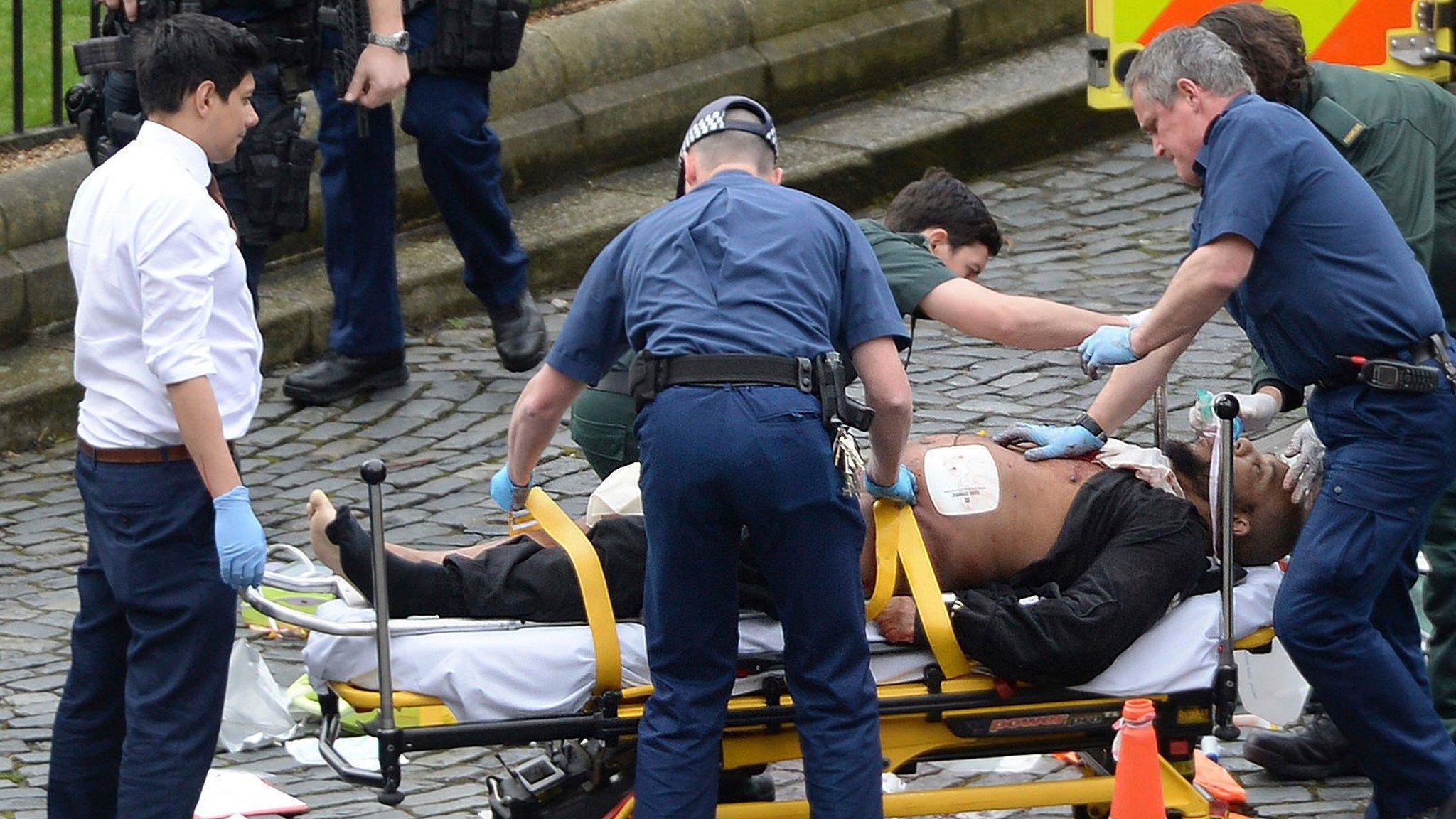
- Published23 March 2017
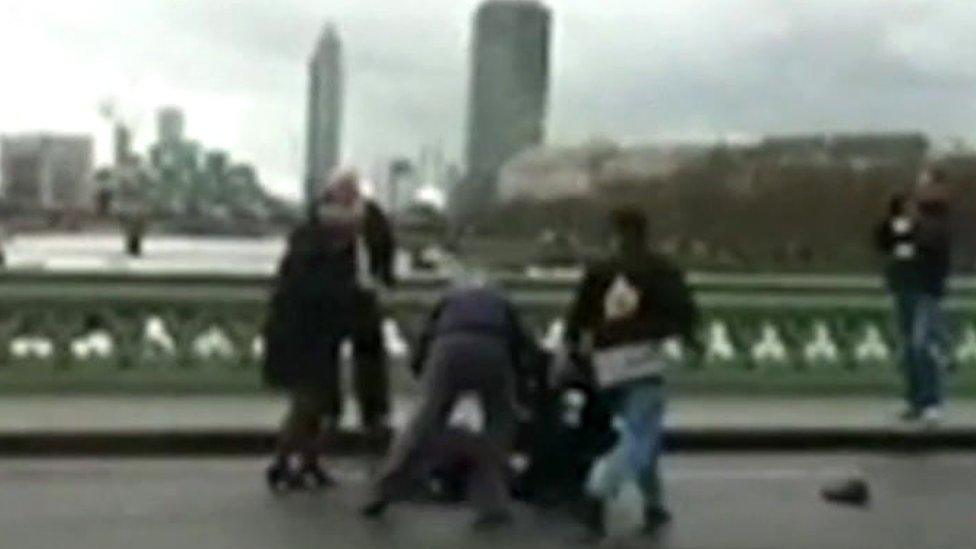
- Published3 October 2018
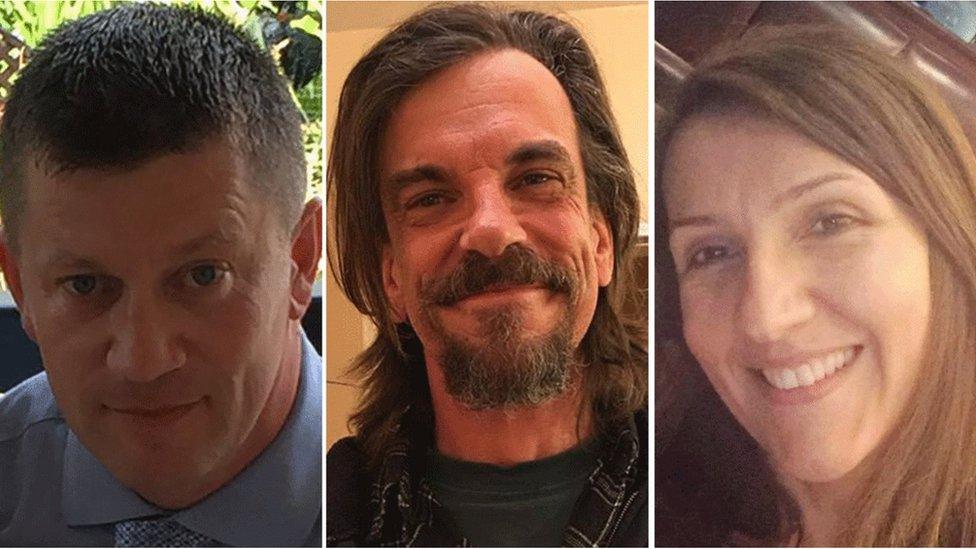
- Published7 April 2017
